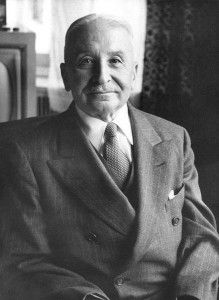Von Mises and Roepke

I've always wanted to understand better the differences between Wilhelm Roepke and Ludwig von Mises. This article is helpful:
Roepke and von Mises: The Difference http://t.co/HNOQ1TAEpt
— The Daily Eudemon (@TheDailyEudemon) April 26, 2015
But the writer never answers the critics of the von Mises critics, like Tom Woods. Consider this passage toward the end (emphasis added):
Finally, Mises and Roepke differ in their judgments on the sufficiency and character of the competitive system when dealing with the needs for successful opposition to collectivism and totalitarianism. Mises insists mere anti-socialism is not enough; a positive endorsement of the competitive economy is needed, a change in ideologies which is, apparently for him, a sufficiently inspiring and positive social gospel. Roepke, though, judges that competition, and with it the competitive market economy, is not a socially positive gospel that makes us enthusiastic but a negative concept adhered to because we like the alternatives even less. We still need something humanly positive to help us endure the strain that market competition imposes on us and we need something more than the sterile either/or choice of laissez-faire capitalism or socialism. That positive vision is Roepke's humane economy, the Third Way. This requires a spiritual and moral reorientation as Roepke understood and recommended, not simply a switch in economic ideologies as Mises wanted.
I guess I'll call this a "bleeding" problem: Critics of von Mises consistently bleed free market principles into metaphysical principles. There is this odd--and ruthlessly rooted--idea out there that a person who believes that everyone ought always be free to sell their products for a price other people are willing to pay is a moral reprobate.
I honestly don't get it. I used to kinda get it, in a vague way, since I kinda thoughtfelt that way. I called people like von Mises "market mystics," people who think the free market answers all our needs, physical and metaphysical, earthly and spiritual, bodily and mentally. But when I read von Mises, and his more radical disciple Rothbard, I saw that wasn't the case at all (see page 63 of Rothbard's Man, Economy, and State (2001 edition) for his distinction between "psychology" and "ethics," on the one hand, and "praxeology" and "economics" on the other).
I'll state the von Mises position, as spun a bit from my Catholicism, as concisely as I can: The market works best when it's free. When the market works best, wealth increases. As wealth increases, everyone on average is better off compared to where they would be without the market. The better off people are, the more they can pursue whatever non-market goals they have. These goals--charity work, prayer, studying, golfing, gardening, drinking, whoring, whatever--are no concern to the market. They're ethical issues that need to be molded by other "institutions," like the Church, family, neighborhoods, whatever. People won't always pursue laudable goals and there will be unfortunately side effects of all the wealth, but that's because of original sin.
That's the positive position.
The negative position is this:
The market works best when it's free. Whenever the government interferes with the market, the market is hindered to some degree, resulting in less overall wealth and at the same time creating unjust wealth distortions: people getting wealth they didn't earn. The greater the government interventions, the greater the detrimental effect on wealth and the greater unjust wealth distortions (witness poverty-stricken third countries where 99% live in squalor and 1% live like kings). This is the result of original sin, which magnifies the unfortunate side effect of wealth (mentioned above) when it is combined with (governmental) power.
